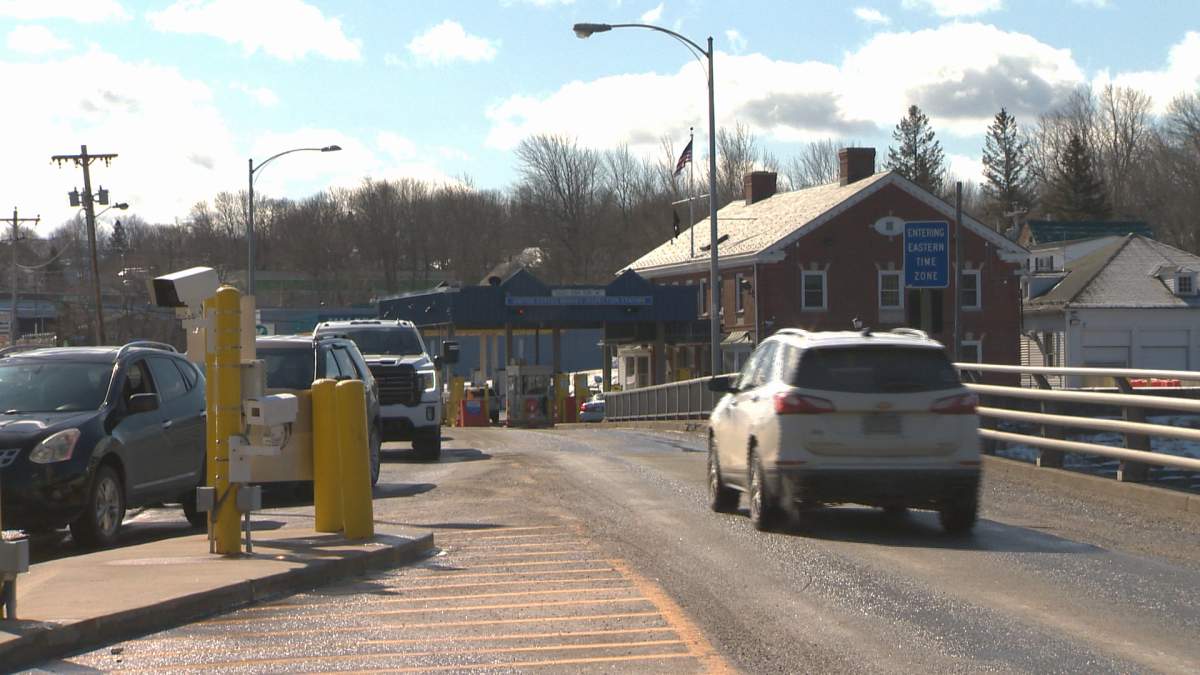As the country adapts to new ways of doing things amid the novel coronavirus pandemic, the town of St. Stephen, New Brunswick is preparing for restrictions at the Canada-U.S. border to come into effect.

With Calais, Maine just across the St. Croix River, residents have become comfortable with crossing into the United States.
“I’m a weekly crosser for sure,” one resident tells Global News. “There are items that are cheaper over there.”
READ MORE: Coronavirus: Canada-U.S. border closure rules still being worked out
Another says they cross every day, “just to look around the stores.”
The announced restrictions of non-essential crossings mean these routines will have to change.
Allan MacEachern, the mayor of St. Stephen, said the drop in cross-border shoppers will be felt on the Canadian side as well.
“It’s definitely going to slow it down,” he said.
“As a border community, we rely on the economics of being a border town. So that’s our engine. That’s concerning.
“But we’ve got to bear down and get through this.”
Many residents seem to agree that the border restrictions are a necessary step to slow the spread of COVID-19.
One concern raised when the move was announced was the shared fire services between St. Stephen and Calais.
St. Stephen fire chief Sean Morton said crews are crossing back and forth whenever needed.

Get weekly health news
“It goes in cycles,” he said, “sometimes we won’t go over for several weeks and I’ve seen us be over there multiple times in a week.”

Morton said, considering fire fighting is an essential service, that will not be affected.
However, they have had to make some changes to their operations.
“We have a composite fire department,” said Morton, “some of us are full-time but the majority are volunteers.”
When the fire department responds to calls, the full-time members attend the scene in the municipal fire vehicles while the volunteers attend in their personal vehicles. That would be trickier now, with having to cross the border.
“We’ve changed our procedures in terms of crossing the border,” Morton said. “The firefighters are going to come to the station, get on the engine or the command vehicle and go over as a group in a marked vehicle.”
One of the other concerns residents have is what will happen to families who live on both sides — will they have to wait for restrictions to be lifted before being reunited?
READ MORE: Community of St. Stephen, N.B. reacts to closure of Canada-U.S. border
Mayor MacEachern said in most cases, no.
“I hate to say the words ‘grey area'” he said, “but it depends how the border officer feels about what you think is essential.”
“I’m hearing it’s going to be a case-by-case basis.”
The restrictions at the Canada-U.S. border go into effect at midnight March 20.
Questions about COVID-19? Here are some things you need to know:
Health officials say the risk is low for Canadians but warn this could change quickly. They caution against all international travel. Returning travellers are asked to self-isolate for 14 days in case they develop symptoms and to prevent spreading the virus to others.
Symptoms can include fever, cough and difficulty breathing — very similar to a cold or flu. Some people can develop a more severe illness. People most at risk of this include older adults and people with severe chronic medical conditions like heart, lung or kidney disease. If you develop symptoms, contact public health authorities.
To prevent the virus from spreading, experts recommend frequent handwashing and coughing into your sleeve. And if you get sick, stay at home.
For full COVID-19 coverage from Global News, click here.







Comments
Want to discuss? Please read our Commenting Policy first.